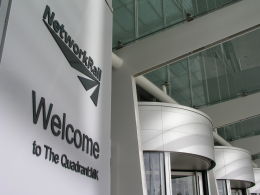Posted 31st October 2013 | 2 Comments
ORR reveals five-year budget for Network Rail

THE Office of Rail Regulation has published its final determination of Network Rail's spending during the five years from April 2014. The headline figure is £38.3 billion, down from the £40.1 billion which NR had said it needed.
The total breaks down into £25.5 billion for maintenance and renewals, plus other costs such as traction current.
The remaining £12.8 billion is for enhancements, and this capital investment will mostly be accounted for by electrification schemes. However, there will also be some smaller projects which are intended to increase capacity, including the Northern Hub in Manchester.
The ORR said Network Rail could achieve savings worth around £1.7 billion, but even so the infrastructure operator will be funded to achieve PPMs of 90 per cent or better on commuter and regional services. The bar is a little lower for intercity services.
The ORR said the company 'will need to improve standards of infrastructure management, network resilience, and safety', and that the cost of maintaining the network must come down by around 20 per cent.
Network Rail is being told that it must achieve the savings by introducing new technologies, better management of the railways and more efficient ways of working, but the ORR issued a reassurance over safety, saying that the budget 'will not come at the expense of safety. There will be increased dedicated funding of £109 million to close around 500 level crossings and improve safety at hundreds more of the highest risk crossings in Britain. There will be around £250 million to help improve safety of track workers, to be invested in new equipment and safer working practices.'
Although today's determination is being described as 'final', and certainly brings a period of consultation to an end, Network Rail now has until 7 February 2014 to respond in detail and accept or reject it.
Network Rail chief executive David Higgins said: “The next five years for the railway will prove to be a critical challenge. A challenge to continue to respond to rising passenger demand and our need to grow and expand the network while at the same time juggling the ever harder challenges of improving performance, reducing cost and delivering huge investment projects from which substantial social and economic benefits flow.
“The determination has to be right to help the company, and the railway as a whole, succeed and deliver what’s needed by passengers, freight users and the taxpayer. We must now look at the individual targets within the determination as well as the package as a whole, and welcome the opportunity provided by the ORR to use the coming months to seek clarification and work through the detail.”
Reader Comments:
Views expressed in submitted comments are that of the author, and not necessarily shared by Railnews.

John Gilbert, Cradley, Herefordshire
Something dreadfully British about Mr Pearce's experience - is it that we are just lazy or that the planners are lazy? One just cannot imagine this scenario happening in France, or Germany - especially the latter. Something about our national characteristics? - and especially the places where it all starts, i.e. Whitehall and Westminster.
Tony Pearce, Reading
Maybe by looking at a specific small example we can see what is going wrong on Network Rail and how savings can be made. I have spent several hours of the last 3 months watching Network Rail erect a new Footbridge at Tilehurst Station to cater for the electrification of the old GWR line. I really am surprised how long this is taking. Its now 14 weeks and counting. I would have thought that the new bridge could have been totally made inside a factory somewhere and then shipped in maybe 8 parts to the site for erecting one weekend by hiring one crane. But no. Some bits are already assembled but then another week elapses whilst a roof is put on one of the parts. And whilst this is being done there are 8 men with Hi-Viz jackets around the site. The roof could have easily been put on in the warmth of a factory and not outside whilst waiting for line possession and ideal weather conditions. Then we wait another week for another part and the crane remains unused until then. In contrast nearby to Tilehurst Station a large Church Hall had all its 20 large windows replaced with double glazing. All the windows were completed off site and easily fixed in 2 days to the building.